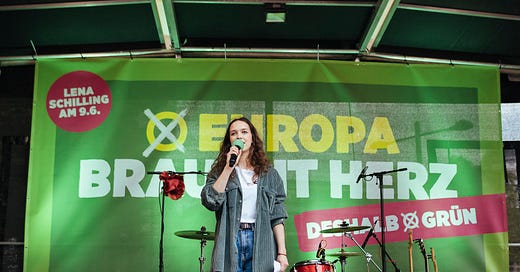Schilling's Value Plummets
The Austrian Greens' lead candidate for the European elections, Lena Schilling, faces allegations about her personal and professional conduct
Servus!
At the tail-end of 2023, it seemed like nobody wanted to be the Green Party’s lead candidate for the following year’s European elections. Sarah Wiener, the face of the Greens’ successful 2019 European campaign, had already announced her intention to step down as an MEP after one term in office. Casting around for an alternative, the Greens apparently heard no after no after no. Environment minister Leonere Gewessler reportedly rejected the offer. Leading MP Michel Reimon took himself out of the running. Justice minister Alma Zadić didn’t want the job, reports indicated.
By the end of January, however, it seemed as if all the Greens’ problems had been solved. Lena Schilling, a 23-year-old environment activist, would lead the party into the European elections, due to be held June 9. Schilling was certainly a bold, brave choice. As someone who’d cut her teeth in the environmental movement, including with Fridays for Future and the campaign against the construction of a road tunnel underneath Vienna’s Danube-Auen national park, she was a brand name. As a young activist involved in fringe politics, she lacked both legislative and real-world experience.
Schilling’s nomination was, then, a Hail Mary pass that had the potential to either pay off big time or fail spectacularly. With less than a month to go until election day, all signs currently point towards the latter. At the beginning of May, the Standard reported on allegations against Schilling that raised questions about her personal and professional conduct. Numerous sources from within the Greens’ orbit told the paper that Schilling had invented and spread rumors about other people—including her political comrades. Some of the rumors dealt with terribly serious matters including miscarriages, marital breakdowns, and sexual violence.
These allegations, though sometimes abstruse, spoke on an elemental level to the content of Schilling’s character. For that reason, they have been treated earnestly by the Austrian press and public, though not the Greens themselves, who have responded with all the grace of a warthog and the nimbleness of the RMS Titanic. Vice-chancellor Werner Kogler called the reports “anonymous farting and grumbling.” Though he later retracted those remarks, it was a completely unacceptable way for one of the most senior figures in the republic to behave. The same could be said of MP and party secretary Olga Voglauer, who spoke at a press conference held Wednesday morning in conspiratorial terms and of “Silberstein methods,” a term that some have warned carries antisemitic connotations. The Greens are in the full throws of panic. They are a party who have lost control.
These allegations—plus fresh reports that she had privately discussed abandoning the Greens upon securing her seat in the European Parliament—have had a corrosive effect on the Austrian public’s perception of Schilling. 64 percent of Austrians believe she should resign as the Greens’ lead candidate, although it is likely too late for her to do so. Her approval rating is now at -50, making her the second-least trusted politician in all of Austria. Only President of the Austrian Parliament Wolfgang Sobotka has a worse approval rating than Schilling. Even far-right Freedom Party (FPÖ) leader Herbert Kickl is out-polling her right now.
It is too soon to say if Schilling’s numbers are dragging down the Greens’ too, though early indications don’t exactly look promising. An IFDD/Kronen Zeitung poll, published May 17, showed the Greens down to 11 percent ahead of the European elections, having polled at 14 percent two months prior. Having backed her to the hilt in dirty and despicable ways and plastered her face all over Vienna—her visage is completely inescapable at this point—the Greens’ and Lena Schilling’s fates are now inseparable. If she sinks, the Greens will go down with her. The party’s only hope is a core group of loyal supporters—principally college-educated women living in Austria’s cities—who may go out to vote for them in spite of everything because they feel as if they have no other choice.
Bis bald!
Thank you for subscribing to the Vienna Briefing. Every recommendation helps, so if you know someone who might be interested in reading this newsletter, consider sharing it with them today.
The Vienna Briefing is a reader-supported publication made possible by your donations. If you would like to contribute to my work, think about sending me a tip.
Aid To Ukraine
Austria is to give Ukraine €5 million in aid via the Ukraine Energy Support Fund, established to counteract the impact of Russian attacks on the country’s energy infrastructure. Austria, meanwhile, continues to be dependent on the Putin regime for its natural gas needs, with 93 percent of gas imports coming from Russia in March.
Graz Storms League
SK Sturm Graz won the Austrian Bundesliga title on the final day of the season, beating SK Austria Klagenfurt 2-0. The conclusion of a double-winning season for Graz, it was the first time since the 2012/23 season that the top title in Austrian football was won by a team other than FC Red Bull Salzburg.
UNESC-No
Vienna’s city center could endanger its world heritage status if the city presses ahead with plans to revamp Michaelerplatz, experts fear. While the city argues its plans will make the square greener and more accessible by planting trees and widening sidewalks, historians and architects fear their intervention will undermine the area’s historic character.




